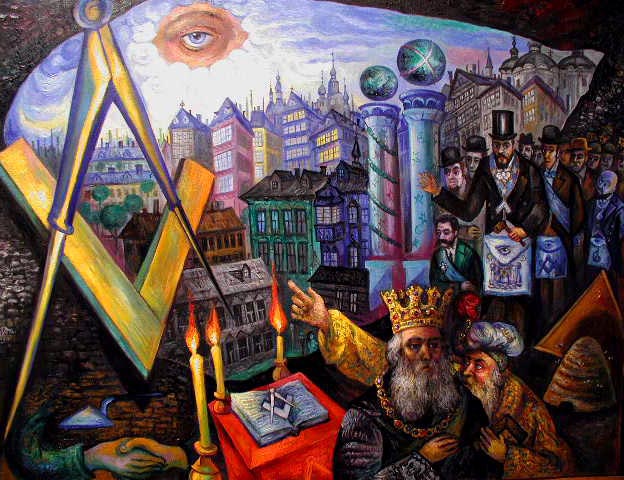In his familiar correspondence, Spartacus speaks more openly and with greater latitude to his beloved Cato. Therein it appears, that anti-religious systems do not alone employ the meditations of the Fathers; for, soon after having mentioned the object of those Quibus Licets in which the young adepts were to give an account of the prejudices they might have discovered in themselves, which of them predominated, and how far they had succeeded in destroying them, he proceeds to say, “It is by these means that I discover such of our Order as have the proper dispositions for adopting certain special doctrines, and more elevated, on governments and religious opinions.” 13 He then continues, “The maxims and politics of the Order are completely explained in the end. Here, in the Supreme Council, they project and examine the plans to be adopted for gradually enabling us to attack the enemy of reason and human nature personally (auf den leib). Here also the mode of introducing such plans into the Order is discussed, and it is decided to which brethren they are to be entrusted, and how far each one can be employed in their execution, in proportion to the insight given to him.” 14
The reader is already too well acquainted with the maxims and policy of Illuminism, not to join with me in saying, Here then is the grand object of this Supreme Council of the Sect! It is in that dark recess that all those artifices are devised for rendering the disorganizing systems of Equality and Liberty familiar to the Illuminizing adepts: There is exactly ascertained the proportion which each class of the Brethren can bear in this universal destruction of religion, empire, society, and property; there again is the day anxiously sought and the means prepared, for hereafter throwing off the mask, and attacking personally the defenders of religion, laws, and property, as so many enemies to reason and humanity; there concentrate all the declarations, the reports, the plans of all the brethren dispersed throughout the universe, that the Sect may judge of its own strength, and compare it with that of the friends to the Altar and the Laws. To sum up all, it is there that the artifices and means are determined on, and the merits and powers of the higher adepts are investigated prior to their being entrusted with that part of the grand conspiracy to which
p. 568
their abilities are best adapted. Let the reader remember, that it is not a stranger to the Sect who has thus described the Areopage; it is the grand Legislator of Illuminism himself. Can we any longer stand in need of the regulations for this council? No; we well know what they must be; we know that impiety, and the most consummate arts in seduction and sedition, are to be their leading features; we further know, that its members must resemble Weishaupt himself, before they can be permitted to sit with him in council. What other bond of union do they need, beside the machination of the most hideous plots, the just or unjust means of forwarding the interests of the Sect as much as circumstances will permit, and the ensuring of success by the blackest and most profound artifices that depravity can invent? The fertile genius of the Legislator, however, would not commit the success of the least of his crimes to chance. He attempted to sketch a code of laws for his Areopagites, and for any future Spartacus that might succeed him. The code contains but a sketch of what he calls laws ad interim. It is to be found in the ninth section of the first volume of the Original Writings, and is addressed to the Areopagites. Many other passages of his letters relate to the same object.—I have transcribed the following articles:
“The Areopagites shall form the Supreme Council (literally, the Supreme College).—Their occupations shall relate to affairs of the greatest importance, and they shall pay little or no attention to such as are less essential.—They may recruit, it is true (können sie zwar recroutiren); that is to say, they may entice Candidates into the Order; but they must leave the care of their instruction to some intelligent adept. From time to time they will visit these Candidates, to inspire them with fresh ardour, to stimulate their zeal—They will be particularly careful in seeing that the progress and method of our Illuminées is every where uniform—They will more particularly watch over Athens (Munich, the principal Lodge after that of Ingolstadt, where Weishaupt resided at the time he wrote these instructions). They will make no reports concerning that Lodge to any body but Spartacus. They will send monthly a statement of all the principal events, a sort of Gazette (Ein art von Zeitung), to the Brethren (Conscii); that is to say, to those only who are initiated in the last secrets. But (continues Weishaupt) nota bene, this Gazette as yet has been no more than our common journal; the Conscii must compose one for the use of the Areopagites. These latter will labour at projects, ameliorations, and other objects of a similar nature, which are to be made known to the Conscii by circular letters. They are the people who are to bear a part of the weight of the general correspondence—They are not allowed to open the letters of complaint (die litteras gravatoriales); that is to say, those containing any complaints against them. These are to be transmitted to the general, to Spartacus, as a sure means of informing him that they fulfil their duty. This instruction being only provisional, and relating solely to the Areopage, shall not be circulated; but the council will take a copy and send back the Original to Spartacus. 15

Moe is the founder of GnosticWarrior.com. He is a father, husband, author, martial arts black belt, and an expert in Gnosticism, the occult, and esotericism.








